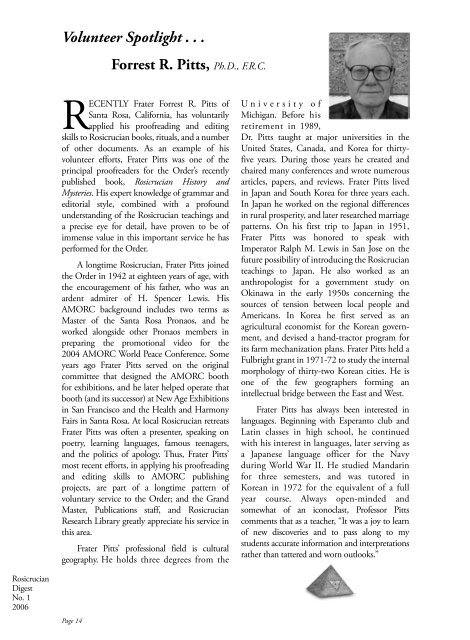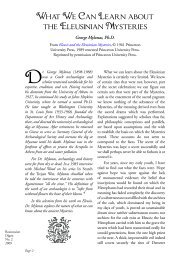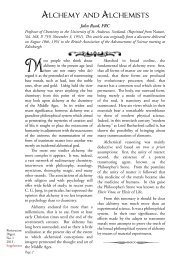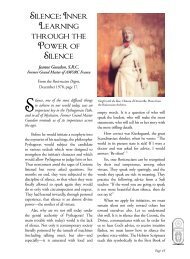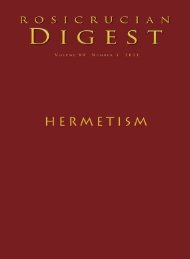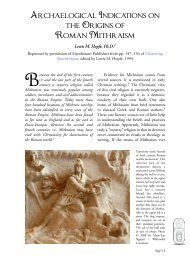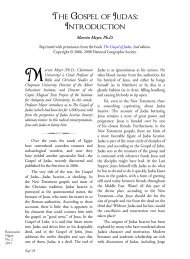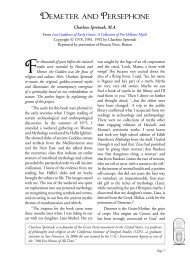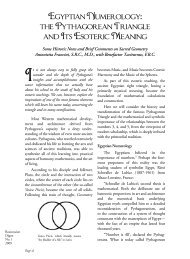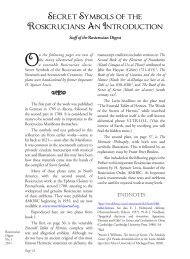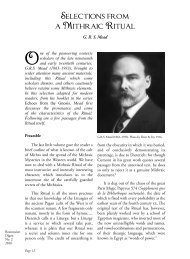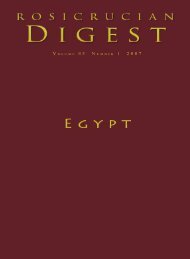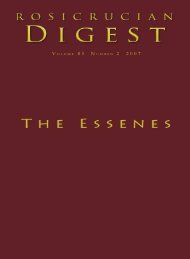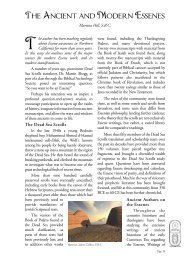The Grand Temple - Rosicrucian Order, AMORC
The Grand Temple - Rosicrucian Order, AMORC
The Grand Temple - Rosicrucian Order, AMORC
You also want an ePaper? Increase the reach of your titles
YUMPU automatically turns print PDFs into web optimized ePapers that Google loves.
Volunteer Spotlight . . .<br />
Forrest R. Pitts, Ph.D., F.R.C.<br />
RECENTLY Frater Forrest R. Pitts of<br />
Santa Rosa, California, has voluntarily<br />
applied his proofreading and editing<br />
skills to <strong>Rosicrucian</strong> books, rituals, and a number<br />
of other documents. As an example of his<br />
volunteer efforts, Frater Pitts was one of the<br />
principal proofreaders for the <strong>Order</strong>’s recently<br />
published book, <strong>Rosicrucian</strong> History and<br />
Mysteries. His expert knowledge of grammar and<br />
editorial style, combined with a profound<br />
understanding of the <strong>Rosicrucian</strong> teachings and<br />
a precise eye for detail, have proven to be of<br />
immense value in this important service he has<br />
performed for the <strong>Order</strong>.<br />
A longtime <strong>Rosicrucian</strong>, Frater Pitts joined<br />
the <strong>Order</strong> in 1942 at eighteen years of age, with<br />
the encouragement of his father, who was an<br />
ardent admirer of H. Spencer Lewis. His<br />
<strong>AMORC</strong> background includes two terms as<br />
Master of the Santa Rosa Pronaos, and he<br />
worked alongside other Pronaos members in<br />
preparing the promotional video for the<br />
2004 <strong>AMORC</strong> World Peace Conference. Some<br />
years ago Frater Pitts served on the original<br />
committee that designed the <strong>AMORC</strong> booth<br />
for exhibitions, and he later helped operate that<br />
booth (and its successor) at New Age Exhibitions<br />
in San Francisco and the Health and Harmony<br />
Fairs in Santa Rosa. At local <strong>Rosicrucian</strong> retreats<br />
Frater Pitts was often a presenter, speaking on<br />
poetry, learning languages, famous teenagers,<br />
and the politics of apology. Thus, Frater Pitts’<br />
most recent efforts, in applying his proofreading<br />
and editing skills to <strong>AMORC</strong> publishing<br />
projects, are part of a longtime pattern of<br />
voluntary service to the <strong>Order</strong>; and the <strong>Grand</strong><br />
Master, Publications staff, and <strong>Rosicrucian</strong><br />
Research Library greatly appreciate his service in<br />
this area.<br />
Frater Pitts’ professional field is cultural<br />
geography. He holds three degrees from the<br />
U n i v e r s i t y o f<br />
Michigan. Before his<br />
retirement in 1989,<br />
Dr. Pitts taught at major universities in the<br />
United States, Canada, and Korea for thirtyfive<br />
years. During those years he created and<br />
chaired many conferences and wrote numerous<br />
articles, papers, and reviews. Frater Pitts lived<br />
in Japan and South Korea for three years each.<br />
In Japan he worked on the regional differences<br />
in rural prosperity, and later researched marriage<br />
patterns. On his first trip to Japan in 1951,<br />
Frater Pitts was honored to speak with<br />
Imperator Ralph M. Lewis in San Jose on the<br />
future possibility of introducing the <strong>Rosicrucian</strong><br />
teachings to Japan. He also worked as an<br />
anthropologist for a government study on<br />
Okinawa in the early 1950s concerning the<br />
sources of tension between local people and<br />
Americans. In Korea he first served as an<br />
agricultural economist for the Korean government,<br />
and devised a hand-tractor program for<br />
its farm mechanization plans. Frater Pitts held a<br />
Fulbright grant in 1971-72 to study the internal<br />
morphology of thirty-two Korean cities. He is<br />
one of the few geographers forming an<br />
intellectual bridge between the East and West.<br />
Frater Pitts has always been interested in<br />
languages. Beginning with Esperanto club and<br />
Latin classes in high school, he continued<br />
with his interest in languages, later serving as<br />
a Japanese language officer for the Navy<br />
during World War II. He studied Mandarin<br />
for three semesters, and was tutored in<br />
Korean in 1972 for the equivalent of a full<br />
year course. Always open-minded and<br />
somewhat of an iconoclast, Professor Pitts<br />
comments that as a teacher, “It was a joy to learn<br />
of new discoveries and to pass along to my<br />
students accurate information and interpretations<br />
rather than tattered and worn outlooks.”<br />
<strong>Rosicrucian</strong><br />
Digest<br />
No. 1<br />
2006<br />
Page 14


